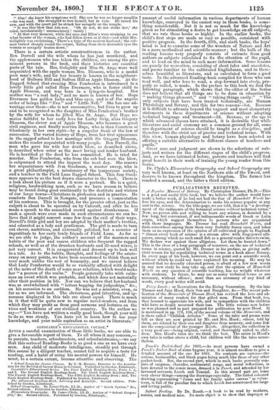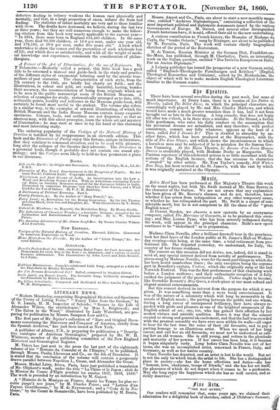PUBLICATIONS RECEIVED.
A Popular Manual of Botany. By Christopher Dresser, Ph.D.—This is a good and useful little book, but we believe the author would have made a better work, if he had not had the fear of Household Words be- fore his eyes, and the determination to make his science popular at any cost to the science. On the title-page, we are told, that it is a develop- ment of the rudiments of the botanical science without technical terms." Now, no person able and willing to learn any science, is daunted by a few long, but convenient, if not indispensable words of Greek or Latin origin, which suggest themselves to persons who are acquainted with those languages. Mr. Dresser has read Household Words' and finds somewhere among them these very foolishly funny ones, and takes them as an expression of the opinion of all cultivated people in England. "Almost every book of science is a stream alive with long jawed alli- gators, among which no such small fish as a general reader dares to swim. We declare war against these alligators. Let them be hunted down." This is the close of a long paragraph of nonsense, on the use of technical terms in science, quoted by Mr. Dresser in his preface, as giving suffi- cient reason for his repudiating technical terms in a book about Botany. In every page of his book, however, we can point out a scientific word, without which he could not have explained his meaning. Ho may be assured that no decently educated person, is afraid of a few new words in any new study he may take up, and that the opinion of Household Words on any question of scientific teaching, has no weight whatever with students. In future, he may use as many technical terms as are necessary, without offence ; more than are necessary of any kind of words, every good writer will avoid.
_Fairy Lands ; or Recreations for the Rising Generation. By the late Thomas and Jane Hood, their Son and Daughter, &e.—The recent pub- lication of the Memorials of Thomas Hood, has revived the love and ad- miration of many readers for that gifted man. From that book, too, they learned to appreciate his wife, and to sympathize with the children who have so deeply mourned their loss. The little volume now before us was planned and in part prepared for publication by poor Hood. It is mentioned in pp. 178, 196, of the second volume of the Memorials, and is there called "Childish Articles." Some of the tales and poems were left as they are now printed by Mr. and Mrs. Hood ; others, told by them, are related by their son and daughter from memory, and some few are the composition of the younger Hoods. Altogether, the collection is a very good one—being original, varied, and thoroughly suited to chil- dren. Mrs. Hood's tales are we think the best. The satire in Hood's own tales is rather above a child, but children will like the tales never- theless.
Punch's Pocket-Book for 1861.—As most persons have owned a Punch's Pocket-Book of some bygone year, it is almost needless to give a detailed account of the one for 1861. Its contents are various—the serious, businesslike, and blank pages being much like those of any other pocket-book. But, the second part, which in such books generally con- sists of enigmas, charades, sentimental songs, and moral reflections, is here devoted to the comic muse, dressed a la iunch, and attended by her favoured servants, Leech and TennieL In this second part are some very clever things—among the drawings especially. The folded coloured drawing representing "Jones and his family under canvas" as volun- teers, is full of the peculiar fun to which Leech has accustomed his large and loving public.
Infant Feeding. By Dr. Routh.—A book to be read by mothers, nurses, and medical men. Its main object is to show that improper. or
defective feeding in infancy weakens the human race physically and mentally, and that, in a large proportion of cases, infants die from bad feeding. The statistics of infant mortality are very sad to those familiar with them. The deaths have decreased, we believe, during the last two or three years; but they are still numerous enough to make the follow- ing citation from this book very nearly applicable to the current year- " In 1854, there were born in England 634,405 children. In the same year, there died 99,209 children, or 15.6 per cent, under one year old, and 178,185, or 28-8 per cent, under five years old." A book which undertakes to show the causes and the prevention of such wholesale loss of life, and which does so satisfactorily, and with all the weight of medi- cal knowledge and experience, commands the consideration of philan- thropists.
A Prissier of the Art of Illumination, for the use of Beginners. By F Delamotte.—Modestly called a primer, this little book has a good title to be esteemed a manual and guide-book in the study and practice of the different styles of ornamental lettering used by the artistic tran- scribers of past centuries. The characteristics of each style, from the 7th century to the 16th, are briefly but clearly set forth ; and the illustrations, in colour and gold, are really beautiful, having, besides their accuracy, the recommendation of being from originals which are to be seen in the public manuscript room of the British Museum. A selection of examples for study, systematically arranged as to date, title, noticeable points, locality and reference in the Museum guide-book, will certainly be found most useful to the student. The volume also refers, in a similar way, to the examples of oriental illuminating, of which the British Museum and the India House Museum contain many exquisite specimens. Colours, tools, and outlines are not forgotten ; so that an amateur may, with this silent preceptor, learn the whole art and mystery of illumination ; he may start at once to try his hand at this charming and moat interesting study.
The enduring popularity of the Vestiges of the Natural History of Creation is testified by its reappearance in an eleventh edition. This book and the Diversions of Purley enjoy this fortune, unique in literature, that they continue to command attention, and to be read with pleasure, long after the collapse of the theories they advocate. The Diversions is a perennial book, though it probably does not contain one sound ety- mology; and the VC8t1:08 seem likely to hold no less permanent a place in our literature.
Boors.
Life on the Earth : its Origin and Succession. By John Phillips, M.A., LL.D., F.B.S.
Narratire of Ten Years' Imprisonment in the Dungeons of Naples. By An- tonio Nicold, Political Exile. Copyright edition.
Whirlwinds and Dust Storms of India. An Investigation into the Law o Wind and Revolving Storms at Sea. With an Addendum containing Practi- cal Hints on Sanitary Measures required for the European Soldier in India Illustrated by numerous Diagrams and Sketches from Nature, and a Wind Card for the Use of Sailors. By P. F. H. Baddeley.
A Dictionary of Political Economy. Part 5.
Family Pictures, 4.e. By the Author of '‘ Mary Powell," &c.
Fairy Land; or, Recreation for the Rising Generation. By the late Thomas
and Jane Hood, their Son and Daughter, &c. With illustrations by T. Hood, Junior.
Gabriel de Mirabeau : or, Biquetti, the Revolution Ring. By Henry Keeble. The Laboratory of Chemical Wonders: a Scientific IdElange, intended for the Instruction and Entertainment of Young People. By G. W. Septimus Piesse.
The Amusing Adventures of Mr. Simon Snuff-Box. By Master Charles Wilson, Ltat Fourteen.
NEW EDITIONS.
Vestiges of the Natural History of Creation. Eleventh Edition. Illustrated by numerous Engravings on Wood.
Home Hints front the Fireside. By the Author of "Little Things," &c. Se- cond Edition.
ALMANACI.
Punch's Pocket-Book for 1861, containing Ruled Pages for Cash Accounts and Memoranda for every Day in the Year ; an Almanack, and a variety of useful business information. The Illustrations by John Leech and John Tenniel. In 2 Parts.
Music.
Kathleen Mayourneen. Crouch's celebrated Irish Song, arranged as a Solo for the Pianoforte by Brinley Richards.
Am I in Dreams Remembered Yet ? Ballad, composed by Stephen Glover. Smile Again, my Bonnie Lassie. The favourite Song, brilliantly arranged for the Pianoforte by Brinley Richards.
My Lilian Schottische. Composed and Dedicated to bliss Amelia Nugent, by W. H. Montgomery.



























 Previous page
Previous page